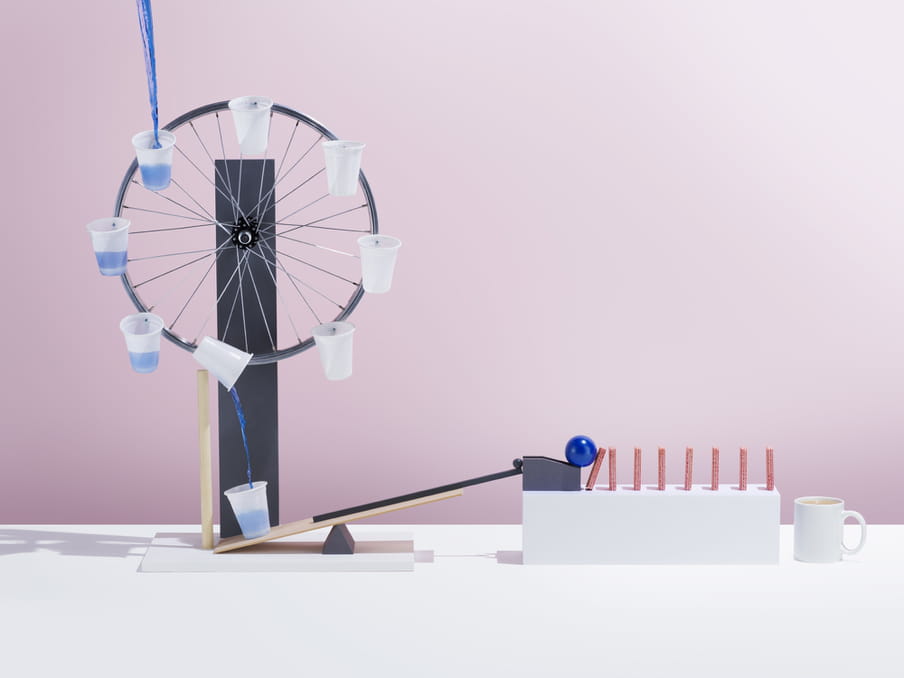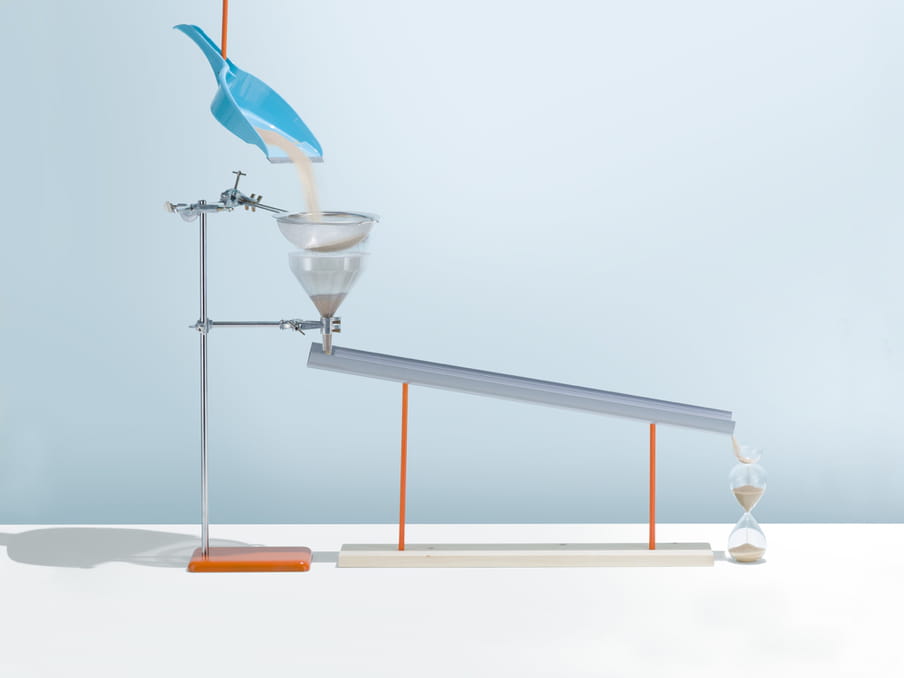In 2012 Rob Rhinehart had an idea that would spark a movement. The software developer was living in a small apartment in San Francisco at the time. He and his two housemates had been given $170,000 from the Y Combinator fund to launch a startup.
But their plan – to develop a new kind of cell-phone tower – failed, and their funds were running out quickly. Despite living on a diet of ramen noodles, groceries were still costing them an arm and a leg. On top of that, the very act of eating was a hassle. Rhinehart calculated that around two hours of his day revolved around preparing, consuming, and cleaning up after food. And he wasn’t even factoring in visits to the supermarket.
And that’s when it hit him: why not just stop eating?
Rhinehart abandoned the startup plans and became absorbed by food science. “I hypothesized that the body doesn’t need food itself,” he would later write in a blog post, “merely the chemicals and elements it contains.” He developed a drink that provided – according to his research – all of his nutritional needs.
The drink he invented had a consistency that resembled pancake batter. He held his nose and took the first sip – and was amazed to find it tasted great. The best breakfast he had ever had. He called it Soylent.
He lived off the stuff for a month. He felt better than ever. His teeth were whiter, his dandruff disappeared, and he managed to read a book about number theory in a single sitting.
He felt like a million dollars.
Software is eating the world
It’s no coincidence that it was a software developer who came up with Soylent. “Programmers are obsessed with efficiency,” writes Clive Thompson in Coders. “It is the one thing I’ve encountered in essentially every coder I’ve met.”
Thompson, a Canadian tech journalist, wrote his book about this particular occupational group because, in the words of venture capitalist Marc Andreessen: “Software is eating the world.”
Think about it: your smartphone, your laptop, your digital television – they all run on software. The newspaper you buy is made using design software, your bank transactions are monitored by machine learning algorithms, and your car is full of gadgets built by computer programmers.
That’s why Thompson believes it’s important to understand who’s behind this software. He spoke to a wide variety of programmers for his book, from the designers of the Facebook “Like” button to hackers fighting online surveillance. And he kept on encountering the same love for efficiency. “Removing the friction from a system is an aesthetic joy.”
That starts with the code itself. The longer the code, the higher the chance of errors. “Spaghetti code” is not done, it even “smells.” Dry (Don’t Repeat Yourself) is the mantra.
What’s more, it takes the system more time to run inefficient code. That can make a big difference when millions of people are using your website. Programming a video to be played on Facebook isn’t a huge task; it gets a lot trickier when you have to program it in such a way that ten million people can watch the video simultaneously without a hitch.
We also owe a debt of gratitude to efficiency for neural networks, which are all the rage in artificial intelligence. “In some ways, the most important advance came not from some technical breakthrough in the mathematics of neural networks – most of which had been worked out in the 1980s – but from computer games,” write Gary Marcus and Ernest Davis in Rebooting AI.
Computer games primarily use something called graphics processing units (GPUs), which are far more efficient than traditional CPUs. They’re especially useful for neural networks – computing systems consisting of multiple layers of “neurons,” which therefore require a lot of computing time.
Ever since a group of researchers started to use GPUs with neural networks in 2012, however, there has been a landslide of breakthroughs. Google Translate, Siri, deep fakes – all thanks to GPUs. And efficiency, of course.

There’s an app for that
And that brings us to the software itself, the goal of which is often to make our lives more efficient. Indeed, many applications are about computerising. Impossible for the tax authorities to sift through all of our returns? Then we’ll create a program that automatically flags potentially fraudulent activities. No time to go to the store? Order from us and your item will be delivered to your doorstep. Soon we’ll even bring it to you by drone. Want to receive news reports, answers to your questions, updates from friends as quickly as possible? There’s an app for that.
Computers are highly suitable for automation, because they’re good at endlessly executing tasks. Imagine you had to add up a million numbers. It’s easy for a computer: put a computing program onto it and – as long as there’s electricity – the computer will solve the sums one by one, much faster than you ever could.
What’s more, computers don’t get tired or bored: the first answer is just as good as the millionth, whereas you would probably start thinking about a nice hot cup of coffee around the fortieth. That’s generally the case: people are bad at repetition. Our attention wanders and we start making mistakes.
According to Thompson, this is the logical conclusion of many programmers:
- Repetitive tasks are boring and I’m bad at them.
- But the computer is good at them.
- Therefore: I’m going to computerise whatever I can.
Often the desire to be efficient is ingrained at a young age. Thompson describes a programmer who used to get frustrated doing dishes as a child. Always the same routine: grab a plate, scrub it clean, dry it, grab a plate, scrub it clean, dry it. He yearned for the day when there would be a dishwasher.
Or the programmer who went nuts as a student every time he had to demonstrate how he solved a maths problem by showing all the steps. So he built a program that solved the problem itself and provided him with the intermediate steps, which he then scribbled onto paper himself.
Many coders are constantly looking for ways to make their lives as efficient as possible. Sometimes it gets a little extreme. Like the person who wrote on a Quora forum that his family and friends thought he wasn’t communicative enough. So he wrote software that automatically sent a message to his loved ones every so often.
An idea about how to live a more efficient life can turn out to be a huge hit. Rhinehart’s blog about Soylent - his hyperefficient way of eating - went viral and prompted a veritable DIY Soylent movement, and after three months he decided he could build a business on it. Rhinehart and his housemates started a crowdfunding campaign. Their aim was to raise a hundred thousand dollars in a month. It took them two hours.

An endless slide down the chute of our most unpleasant impulses
Let’s face it: the drive for efficiency has brought us many benefits. It’s a great relief that the abacus, for example, is just a toy these days. These days we do our calculations on calculators, Excel or other software. Whether you’re a retailer, tax payer or scientist – it saves you time and prevents you from making errors.
But more efficiency isn’t necessarily better. Because programmers come up with smart solutions that make our lives more efficient, us “regular people” forget how to do certain things.
I recently lost my iPhone and was forced to spend my days with a prehistoric Nokia. But how was I going to get to the mobile phone shop to pick up my new sim card? I memorised the route on the laptop and hoped – God forbid – that I wouldn’t need to ask anyone the way. Reading maps, talking to strangers - we’ve got out of the habit of doing that.
In Hello World, mathematician Hannah Fry argues that pilots are less skilled at flying since the advent of automatic pilot. They chalk up fewer solo flight hours and when they do have to intervene, then it’s often in exceptionally difficult circumstances that the autopilot can’t handle. So imagine what self-driving cars are going to do to our driving skills once they take off.
There’s another problem: “evil” is becoming more efficient too. “In the old days, it took time and effort to steal secrets, blackmail people, and meddle across borders,” writes computer scientist Justin Kosslyn, who until recently worked for Google. “Then came the internet.”
The problems with efficiency go beyond crime, argues journalist Ezra Klein in an essay on the importance of friction . “I wonder about the whole damn thing,” he writes. “Whether it’s all gotten so fast and so easy and so frictionless that we’re on an endless Slip ‘n Slide down the chute of our own worst impulses.”
With Netflix you don’t even have to get up to move on to the next episode (it’s with good reason that in 2017 the CEO said that “sleep” is the company’s biggest competitor). You can share your opinion extremely efficiently on Twitter, and out come the trolls from under their bridges. And journalists can put their reports online 24 hours a day, which has only made news more sensationalist.
The important question to ask here is: efficient for who? As we trudge tirelessly through superficial, hate-mongering messages, the ones who essentially benefit from lack of friction are the tech companies. More clicks, more ads, more money. But for us, sometimes life has only become more inefficient.
Efficiency as a value
Soylent had its disadvantages too. Not only did the beverage cause flatulence (“I cleared out a jazz theatre once,” joked Rhinehart in the New Yorker), it’s still not clear whether these kinds of drinks actually give you all of the nutrients that you need. Food science simply isn’t advanced enough yet to make that call.
Even if you managed to fix all of these glitches, critics of Soylent argue that it ignores the social value of food. What do you do on your first date? You go out to dinner. On holidays you get together with your family again for Christmas dinner. And if you need a break at work, you go grab a quick lunch (unless you’re facing a deadline for your article on efficiency, of course).
People who search for ways to make life more efficient often overlook what gets lost in the process. It’s often difficult to gauge the value of these things. Maintaining social contacts takes time and money, but what are the benefits? Try putting a number on that.
Even if we could quantify it, it would still be a subjective score. But so is saving time and money. Sure, it so happens we can express them in terms of minutes and dollars, but that doesn’t make their value any less subjective. The question remains: how important is it to you?
This subjectivity is already enshrined in the Wikipedia definition of efficiency : “avoid wasting materials, energy, efforts, money, and time in doing something or in producing a desired result.” But what “desired result” are you trying to achieve? And which resources do and do not count? These are inherently moral questions.
So let’s call a spade a spade: efficiency is a value. Just like democracy, love, and autonomy. And perhaps we protect these values precisely by making matters less efficient.

The benefits of friction
Friction doesn’t always have to be problematic. In recent years many people have put forward the notion that it’s actually something extremely valuable.
Democracy, for example, depends on friction. We disagree and stumble on together looking for a solution. "When inefficiency is the result of a deliberative commitment by a democratically run community,” writes technology critic Evgeny Morozov in To Save Everything, Click Here. “There is no need to eliminate it, even if the latest technologies can accomplish that in no time."
Friction is important on a smaller scale too. Fighting with your partner, working out with your family who’s going to eat where on Boxing Day, confronting a fellow passenger on a train who’s making too much noise – it’s through these moments of conflict that you discover what’s important. “Genuine connection to other people tends to happen in the context of conflict,” says the philosopher Matthew Crawford in The Guardian .
Moreover, friction is simply good fun too. It all seems so convenient – order clothes online, ride a bicycle that always works through a bike-sharing scheme, have your meal delivered to your doorstep – but in the process you also lose touch with the “real” world.
“We increasingly encounter the world through these representations that are addressed to us, often with manipulative intent: video games, pornography, gambling apps on your phone,” according to Crawford. “These experiences are so exquisitely attuned to our appetites that they can swamp your ordinary way of being in the world.”
Crawford’s own life story shows us that things can be done differently.
Reclaiming your time
After Crawford took his PhD in political philosophy he started working for a think tank in Washington, DC. But he soon got fed up with the work. He no longer felt like providing ‘scientific’ arguments for organisations who simply wanted to get their way. To help oil companies with their sales, for example, in times of climate change. He quit his job after five months.
He decided start his own company. Nope, not a tech startup, but a motorcycle repair shop. There, he was once again confronted with the real world, where people aren’t constantly asking you to justify your worth. You “simply point: the building stands, the car now runs, the lights are on.”
Of course you don’t have to immediately quit your job to introduce a little more friction into your life. Nor do you have to renounce technology. Indeed, the same technology that has made our lives more efficient can also present us with obstacles. That doesn’t mean that programmers should just write inefficient code. It does mean that they could commit to other values than efficiency in their software.
That can be pretty simple: look at infinite scrolling, for example, a technique that enables you to scroll endlessly on social media. You could easily end up in a rabbit hole of updates. This lack of friction is great for Facebook et al, but not so great for you. A popup that asks you if you want to continue or an extension that disables that infinite scroll helps you to make a more conscious choice.
And take “the evil” that is spreading more rapidly, according to Kosslyn. Why shouldn’t we slow down information a bit so we can first check its validity? “A disease cannot become an epidemic if patients are cured more quickly than the illness spreads,” he argues.
But perhaps we shouldn’t expect Big Tech to provide the solution, because for many companies efficiency is the business model. So we shouldn’t expect them to introduce more friction, as they will lose revenue.
So we’re going to have to do it ourselves. In his book Digital Minimalism, Carl Newport explains the importance of having “a philosophy of technology use.” By thinking about the things you truly value and matching them with the corresponding resources, you’ll start to follow your own goals and not those of the tech companies. Why do you need Facebook to stay in touch with your aunt if you could just drop by instead?
Not everything has to be done online. Just as Crawford started to repair motorcycles, you too could derive great pleasure from mending clothes, preparing a meal or fixing your bicycle. Or do absolutely nothing for a change, as Jenny Odell advocates in How to Do Nothing. Her publisher’s blurb is telling: “this book is a four-course meal in the age of Soylent.”
In any event, soon I’m going to cancel my bicycle subscription. And cook a fancy meal this evening. How very inefficient.
This article was translated to English by Mark Speer. Part of this article was published previously as a newsletter on De Correspondent.

Dig deeper
 Artificial intelligence is more human than it seems. So who’s behind it?
Artificial intelligence is often presented as the answer to all our major problems. Except of course, it isn’t. Sanne gives three reasons why
Artificial intelligence is more human than it seems. So who’s behind it?
Artificial intelligence is often presented as the answer to all our major problems. Except of course, it isn’t. Sanne gives three reasons why
 Sign up for the newsletter
Follow Sanne’s weekly newsletter to receive notes, thoughts, or questions on the topic of Numeracy and AI
Sign up for the newsletter
Follow Sanne’s weekly newsletter to receive notes, thoughts, or questions on the topic of Numeracy and AI


